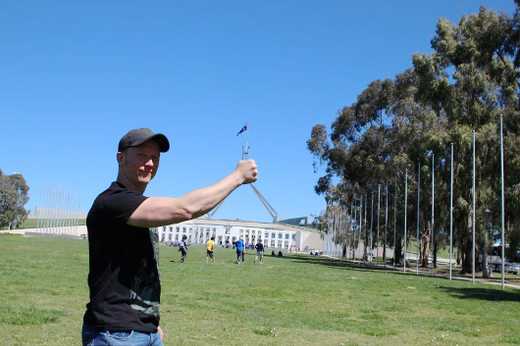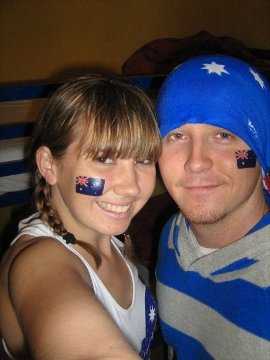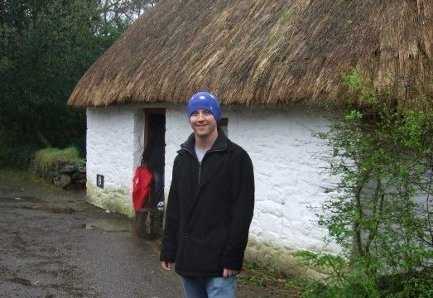Australian English: Here's Why It's The Best Variety In The World
 Written byHubert Nagel
Written byHubert Nagel- Read time12 mins
- Comments13


Happy Australia Day weekend!
I’m currently home from the Middle East on a nice long break and since it’s Australia Day this weekend I decided to revisit one of my awesome posts on one of the many things that make Australia the best place on Earth – our variety of English.
Enjoy!
Read that heading again!
Some friends of mine decided to chuck a little surprise dinner for me with some great tucker and a few beers recently.
It made me feel special. Loved in fact.
However there were a few Canadians and one Irishman there who thought’d be a cack to take the piss out of the Aussie accent all night (for some of these Canadians it was their first week in Australia) by exaggerating Aussie stereotypes and trying to get me to say stuff for their amusement.
These Canadians reckon it’s pretty funny when us Aussies say “Coke with no ice!” (‘coyk with no oyce’) and I can’t recall how many times I’ve heard “knifey spooney” get mentioned around me (a piss-take from The Simpsons). If not The Simpsons, a lot of people tend to think of Steve Irwin, Crocodile Dundee or the sharks from Finding Nemo whenever they think of Aussie English.
There’s so much more to our variety of English (pure English as I call it) than annoying clichés and stereotypes so today I’m writing about it!
Most of the people who read this blog aren’t Aussies so I thought it’d be a good idea to explain a thing or two about what I believe to be the best variety of English in the world.
I’m not biased. I’m just telling it like it is
Word of advice: A lot of books on Aussie slang give outdated expressions that we don’t really say anymore. The Lonely Planet phrasebook seems to be the most accurate one.
Dialects of status/identity rather than region
If you head to the UK or Ireland you’ll find that you only have to travel an hour (or less) down the road and you’ll find people speaking a different dialect of English to the town you were just in.
Compare that to the enormous island continent of Australia where you can fly 4-5 hours from Brisbane to Perth and there’s no noticeable difference in the way people talk. Even North America has some vastly different dialects depending on where you are but Australia’s a bit different.
It’s generally accepted that there are 3 main types of Australian English:
General, Broad, and Cultivated.
These are not regional dialects however.
They have more to do with a person’s socio-economic status or group affiliation then anything else. Rather than talk about the different phonology and structure I thought I’d just share some samples so you can hear the difference.
General Australian English is the most common and what we’d consider to be the neutral accent. For us Aussies, someone speaking this variety doesn’t really have any accent and most of the population tends to speak it.
Here’s an example of ‘Wolverine’ speaking General Australian English:
Broad is what we’re famous for.
It’s also often regarded as the language of the uneducated working class or bogans which isn’t always the case (our current Prime Minister speaks with this accent).
All the stereotypes and clichés that are floating around are based on this one accent. Here’s a sample from one of our greatest exports:
And finally there’s cultivated.
People with a quasi-British accent and what I like to call haughty-taughty Melbourne-types.
Here’s a sample from one of my favourite actors, Geoffrey Rush:
Aussies shorten just about everything
We’re experts at doing this (especially those of us with a broad accent).
Observe:
This arvo me and my mates from Rochey are gettin’ together to have a barbie and watch the footy. Laz and Smitty‘ll be there. Oh shit, I gotta go pay me rego. I’ll stop at the servo on the way and pick up some ciggies.
These are called diminutives – when words get shortened and in the case of Aussie English, almost always end with a vowel.
Rochey – Rochedale.
Arvo – afternoon.
Barbie – barbecue.
Footy – football.
Laz – Larry.
Smitty – Smith.
Rego – registration.
Servo – service station.
Ciggies – cigarettes.
Oh, and you know how I said my name’s Hubert? Actually my mates call me Dono and my family calls me Donny – I rarely hear people call me by my whole name*.*
I’m not exactly sure why we do this but Kel Richards came up with 3 good possible reasons:
1. Verbal playfulness. The English speaking colonies in Australia were planted by folk from all over the British Isles speaking many different dialects. Thus thrust into close contact with each other they became extremely sensitive to language differences, and (from this, I would suggest) much given to verbal playfulness. Aussie English remains highly inventive and colourful, and diminutives are but one example of this.
2. Informality. Australia has a particularly informal culture. There is far more linguistic formality, for example, in the deep south of the US where people can still be addressed as “sir” and “m’am” even by other adults. Australia, by way of contrast, is (as one person once observed) a country where “everyone expects to address their doctor by their first name.” The heavy use of diminutives is one linguistic expression of Aussie informality.
3. Group solidarity. By using Aussie diminutives we are signalling our membership in the club of “Aussie-ness”… and by addressing you with diminutives we’re including you in our club as well. Group jargon defines the group. If English speakers from overseas don’t understand our diminutives, well, that’s because they’re not us!
How the bloody hell did Aussie English come about anyway?
I have to share this insightful little snippet with you from Burridge & Mulder, English in Australia and New Zealand (2005):
Much discussion has focused on the origins of OZ and NZ pronunciation, and at times the speculations have been wild. Some have maintained that these accents are caused by climate, by a national nose inflammation as a result of pollen or hay, and even by fear of opening the mouth on account of dust or flies; other accounts look to carelessness, laziness, some kind of gross national inferiority complex, a free-wheeling and adventurous spirit, or an outlaw heritage. Even ill-fitting dentures have been suggested as a likely cause.
A bit silly but these are actual theories!
They go on to say that there are two main theories about the origin of Aussie English:
1) A mixture of regional accents from Britain and Ireland that kind of ‘melted together’ and became what it is today.
2) Mainly descended from Cockney English (‘ello guvna!’).
Now as you probably know (unless you’ve never been to school or grew up under a rock somewhere) Australia was founded as a penal colony for Great Britain. What this basically means is that their jails (gaols) were jam-packed and they needed somewhere to send their criminals, and since North America wasn’t accepting criminals in the late 1700’s they were sent down to Australia.
It wasn’t considered a holiday destination back in those days!
Cockney’s were the lower ‘ratbag’ class of London and the Irish were arrested for pretty much anything – they only had to sneeze near an Englishman and they’d be put on a boat to Australia.
As a side note if you ever get a chance make sure to check out the Wicklow Historic Gaol in Ireland (an hour or two south of Dublin) and read the curses that the Irish prisoners scratched into the walls of their cells for being sentenced to 8 years in Australia (8 years was a life sentence too because they never made it home). That place should be a pilgrimage spot for every Aussie – it was a pretty emotional experience being there.
Anyway, I’d like to highlight three really distinct influences on our English: the Cockneys, the Irish and the Australian aborigines. If you were to sit down and take a good, hard look at the vocabulary, grammar and pronunciation of Aussie English then these sources really stand out.
The Cockneys
I’m sure that like every language and dialect, Cockney has evolved somewhat over time so you can’t make a really accurate comparison here, but I thought I’d post a sample of the modern day Cockney accent if you haven’t heard it before. This is from one of my favourite films, Lock, Stock And Two Smoking Barrels:
Here are a few things for you to listen out for in the clip:
- Like most British English dialects, Cockney is non-rhotic. What this means is that unlike Americans, Canadians and Irish they don’t pronounce the ‘R’ unless there’s a vowel in front of it. E.g. car sounds like kaa. Australian English is a very strong non-rhotic variety like Cockney.
- Sometimes the letter ‘T’ is replaced by what’s called a glottal stop. This is where air is momentarily stopped causing something like a little speed bump in your speech. E.g. “shor’age (shortage)”, “you go’ i’ all (you got it all)?”. In Aussie English we do occasionally do this but not as much. E.g. “he was hi’in the ball (he was hitting the ball)”. Usually the ‘T’ just sounds like a ‘D’ though. E.g. shid ‘ouse (shit house).
- In the “shid ‘ouse” example I’ve just given you’ll notice the ‘H’ is silent. Notice how the Cockneys say “‘e’s (he’s)”.
- The ‘TH’ sound is often replaced by an ‘F’ or ‘V’ in Cockney. E.g. he’s a fucking feef (thief), “nuffing (nothing)”. Occasionally (but not as often) you’ll encounter this in Australian English.
- See how this Barry bloke gets called Bazza? This is what I talked about earlier. We’re renowned for this.
The Irish

Because the Irish English dialects (Hiberno-English) are rhotic the influence of the Irish on Australian English isn’t as obvious as the British are, but it’s important to know that in the late 1700’s and early 1800’s most Irish people either only spoke Irish Gaeilge or spoke English as their second language.
That means that most of the Irish prisoners sent to Australia would have spoken Irish as their first and possibly only language, and thus their children would have been forced to learn a British variety growing up.
It goes without saying that Gaeilge has influenced the vocabulary of Aussie English along with plenty of place names across Australia being the same as towns and villages back in Ireland. For example, I live in Queensland where we have places like Innisfail, Clontarf, Cloncurry, Enniskillen, and Donnybrook to name a few.
At the beginning of this post I used the word – tucker. Tucker basically means food in Aussie English but comes from the Irish word tacar. From this we created the word tuckshop (like a school cafeteria).
Shut ya gob! An Irish word meaning beak (as in the beak of a bird), gob is used here to mean mouth.
I’ve got the gift of the gab. Gab is another Irish word meaning speech/talk. We say someone has the gift of the gab when they’re talkative, very sociable or a good liar.
You’ve no doubt heard of blokes and sheilas. Well, sheila is actually a common female name in Ireland (Síle).
And so on.
One really important (and not researched enough in my opinion) contribution made by the Irish to Aussie English is the way that Irish culture shaped the way we use our language. The laid back, egalitarian culture where everybody (young, old, wealthy, poor, local or foreign) are all mate (along with our jovial nature). Although the culture has been changing, there’s this general rule that everybody is on par with each other and there’s no respect for snobs. Bloody poms!
A theory that I’ve read (and tend to agree with) is that it goes back to the days of the first Irish settlers in Australia battling to survive the harsh conditions of Australia and the English crown. Even today this working class battler status is revered by us as sacred in a way.
This Barnzy (Jimmy Barnes) song is pretty much the second national anthem of Australia.
The Australian aborigines
Sadly, hundreds of Australian aboriginal languages have been lost over the last two centuries with many more currently endangered but they’ve been a huge influence on the development of Aussie English, and about a third of all place names in Australia are aboriginal names.
A few examples from the area I live in are Coombabah, Nerang, Tamborine (this is an aboriginal word from the Yugambeh language – not the musical instrument), Worongary, Mudgeeraba, and Canungra. Absolutely everywhere you go in Australia you’ll see place names like this.
Most of our animal names are aboriginal too:
Koala, kangaroo, wallaby, kookaburra, barramundi (fish), dingo, and heaps more.
One really common expression you’ll hear in Queensland is hard yakka. This was actually the word for work by the Jagera people around what’s now Brisbane and we’ve even got a work clothing brand named after it.
Some aboriginal communities today also speak creoles which are basically hybrid languages where English and a local language have mixed together. They can’t really be understood by English speakers though.
If you get a chance I recommend you check out the movie Ten Canoes which is scripted entirely in the dialects of the Yolngu people. It’s a beautiful film:
If like me you’re passionate about language revival and have an interest in Australian aboriginal languages then also consider helping out programs like this one.
The best variety of English on Earth
Okay, I’m a bit biased.
There’s so much about our Aussie English that I’m proud of and I’ve only touched on a few things briefly here. I could write heaps and heaps on this and give bucket loads of expressions as examples but I think this will do.
As I said earlier, if you want a good little reference for Australian English that isn’t out of date or lame then grab the Lonely Planet phrasebook.
Hope you enjoyed this post! If you did like it or if you’re a proud Aussie then share it around by clicking the ‘Like’ button here. Cheers!
 Grab the link to this article
Grab the link to this article